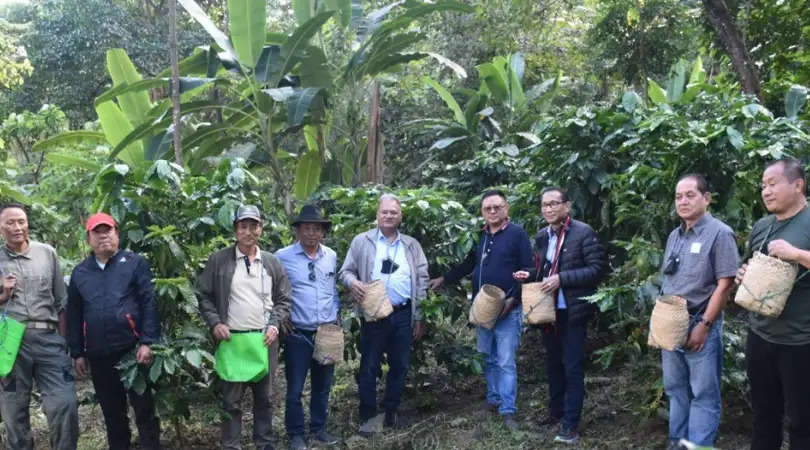Nagaland govt promotes coffee cultivation, plans to increase production for exports

KOHIMA:
In a bid to encourage coffee plantations in the hills of Nagaland, the state land resource department is encouraging organic coffee cultivation in fertile areas, with targets to increase the production substantially in the future.
Nagaland agriculture production commissioner Y Kikheto Sema informed that the state presently has nearly 10,000 hectares of coffee cultivation, and it is taking steps to expand it to 50,000 hectares by 2030.
Sema also mentioned that the state has exported 27.5 metric tonnes of Nagaland coffee to the South African company, Noble Cause, which signed an agreement to buy it for 30 years.
To assess areas where the plantations can be taken up on a large scale, state chief secretary J Alam and Sema, along with land resources department officials, made an experimental visit to Kebentsin Agri and Allied Cooperative Society coffee farm in Sendenyu village under Kohima district on November 4.
"Our aim is to generate at least one lakh jobs as Nagaland lacks industrial activities. Another aim is to prevent the impact of climate change by encouraging farmers to give up Jhum (forests are slashed and burnt for farming) cultivation and switch over to coffee,” Sema said.
Alam, on the other hand, said that the extensive coffee cultivation will not only uplift the state's economy, but will also help in generating employment for the youths, who do not have many opportunities in the state.
"Employment has reached its saturation point and the youths have to find and invest in other avenues. Coffee being a very promising crop, I urge the youths to take up these kinds of activities which are labour intensive and provide sustainable income," Alam said.
Alam also pointed, “Potential has always been there, and we are blessed with very fertile land and huge resource. For the last decades, we have been experimenting with different land-based activities for viable crops. Unfortunately, it failed because substantial activities were not taken into consideration.”
The Chief Secretary lauded Sendenyu village for being a biodiversity conservative village and appreciated the efforts of the villagers for protecting and conserving the density of forest which will contribute a lot in balancing the biodiversity.
Elaborating on the cycle of coffee plantation, Kohima district programme officer Dr Menuosietuo Tseikha said planting of the seeds are carefully selected according to the unique microclimate, flavour and aroma and exceptional cup quality which will take approximately three to four years for the newly planted coffee trees to bear fruit. The fruit, called the coffee cherry, turns bright and deep red when it is ripe and ready to be harvested, he added.
TNT-The Northeast Today is now on WhatsApp: CLICK HERE to receive more updates on your phone
ALSO READ: Nagaland's "sweet cucumber" gets geographical indication tag

















